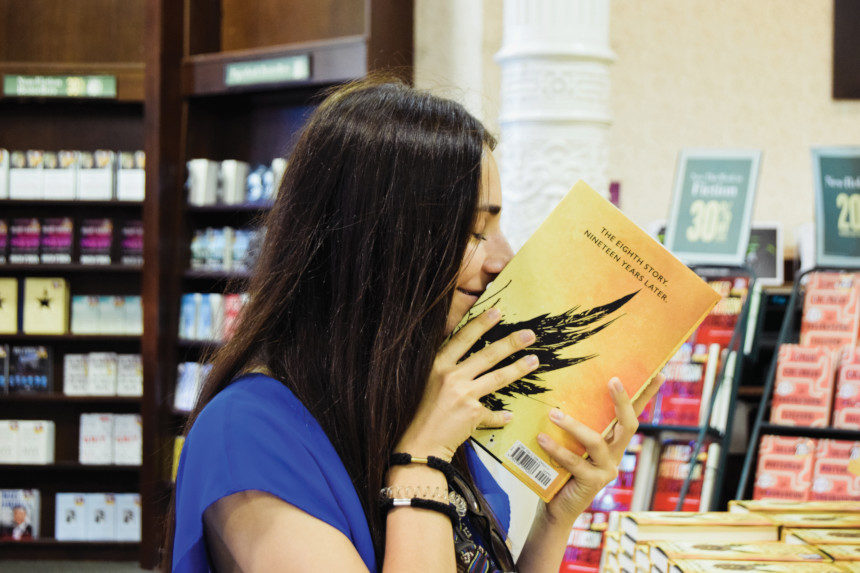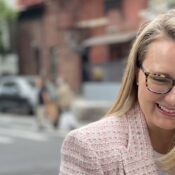Late last year, in an essay about the coronavirus pandemic, National Geographic magazine settled on three words to describe how Americans are feeling: “lonely, hollow, heartbroken.” That seems about right. Naturally, however, some of us are faring better than others as misery and grief billow all around.
With that as a predicate, I recently inquired of friends and colleagues, “What is your magic tonic, if any? How are you getting by?” It turned out that among the best salves is the distracting and edifying power of popular culture. As Austrian artist Maria Lassnig once said, “Living with art stops one wilting.”
Granted, most of what’s delivered by America’s television, film, music, and book industries does not constitute high aspirational art. But at least we’re sometimes in the vicinity. Our popular culture, in all of its manifestations from goofy to glorious, serves a noble purpose in a time of need, which this is: Whatever elixirs work, bring them on. When Powell’s, the country’s largest bookstore, surveyed its customers about what they most missed during the COVID-19 lockdowns, the answer surprised: It was the aroma of books. So, in a move of marketing genius, Powell’s released a unisex fragrance — an eau de bookstore.
In my own case, sensing some unanticipated fragility, I posted on social media to say maybe I was beginning to falter beneath the emotional weight of the pandemic. “So many things instantly trigger tears: a song, a poem, a paragraph, a photo,” I wrote, referring to the culture all around. The reaction was compassionate. Also, painfully honest. Some respondents offered that they were embarrassed to reveal their personal strategies for surviving in this strange new world. A typical comment, from a woman in Massachusetts: “I think the characters in TV series have been taking the place of my friends and social outings. Sad.”
With cinemas mostly shuttered, stage productions halted, and concerts canceled, it was streaming entertainment more than anything else that Americans sought as a cathartic escape. Netflix in particular has filled the void, its viewership soaring as Americans huddle in front of their big-screen TVs. Last spring, shortly after the virus landed here, the company released Tiger King, a cringeworthy documentary that was nevertheless embraced by audiences; months later, as if to apologize for that trifle, Netflix streamed The Queen’s Gambit, a highbrow dramatic series about chess. Both of those hits gave us something to talk about in the absence of our quotidian pre-pandemic chatter.
“I think the characters in TV series have been taking the place of my friends and social outings.”
So, as we’ve witnessed time and again this century, it’s been the internet that in various ways has helped to rescue us. Beyond filmed amusements (and cat clips), it brings us books and music. Cristina Barcelo, a therapist with a specialty in trauma, several months ago told a blogger that in times of anxiety, people must include music in their lives “because of the positive effects on the brain.” Publishers, too, have released books on a largely uninterrupted basis. Curiously, though, it’s been sales of ebooks and audiobooks that have spiked.
Ultimately, it was left to Amazon, which began as a bookseller, to find a wholly predictable way of capitalizing on our angst. I noticed that in some of its brick-and-mortar stores, it recently chose to feature one particular title near checkout registers: How to Be Happy (Or at Least Less Sad). Ah, so caring, that Amazon.
In the last issue, Cable Neuhaus wrote about the smile-generating power of balloons.
This article is featured in the March/April 2021 issue of The Saturday Evening Post. Subscribe to the magazine for more art, inspiring stories, fiction, humor, and features from our archives.
Featured image: Tome is where the heart is: Housebound customers missed the aroma of books, so Powell’s bookstore released a fragrance that smelled … just like a bookstore! (Shutterstock)
Become a Saturday Evening Post member and enjoy unlimited access. Subscribe now




Comments
Seems to me that the “culture” has been greatly swayed and deluded by the so-called media, and that is not to its glory, where the culture, which once was mostly good, honorable, moral, and God-honoring has just jumped on ship with those who have lost their moral and spiritual goodness.
Perhaps the value of the pandemic is to be a calling-card to right-thinking, thankfulness to God, and repentance as Lincoln called us to at Gettysburg.
Call me counter-cultural and a follower of Jesus.
Unfortunately, 500,000 did not make it through 2020!
When I was 7, I was brutally injured in an event which killed five people, left two others severely disabled for life, and inflicted psychological depredations which have haunted unknown numbers of people ever since.
I haven’t had a physically healthy moment since. I made a faux recovery, but in my teens, one injury in particular began to tell its severity by a long, gradual weakening which hit me, kept me from ever being able to be any sort of serious college student, and has left me thoroughly disabled throughout my adult life. I’m in late middle age now, and there are no exciting possibilities of treatment which could restore me.
I’ve never been able to work or to have a social life, let alone marry. I’ve lived most of my life alone, in what I call “inefficiencies.” At one point, I had to live on less than $9,000.00 per year for a full decade. Every trip I’ve made since I was a child, when I would go on summer vacations with my parents, has been hasty, and all about the business of seeing a doctor. I’ve gone entire decades without eating in a restaurant. The last movie I saw in a theater was in 1982.
You can imagine my bemusement at the spectacle of the last year, reading about people’s heartbreak because of their isolation and, in many cases, severe reduction of income.
I’m not unsympathetic with them. I do realize that the impositions required for our not being overwhelmed beyond the breaking point by COVID-19 have given them an experience of life which they are shocked by. They have suffered beyond anything they’d ever expected.
At the same time, I cannot help having metaphorically rolled my eyeballs at the accounts which are constant of people’s profound disorientation, loss of hope, near cracking up.
They’ve had to endure for a year what I’ve had to live with for a half century. Plus, most, and indeed, thank God for it, have not been severely affected medically by COVID-19, while every day of my life is a fight to withstand pain and terrible physical dysfunction.
As I said, I’m not unsympathetic. I do, however, see all of this as evidence of how spoiled most people are, how untested, and frankly, how empty they are.
I’ve been a Christian since childhood, and do not pretend that if it were not for the Lord’s presence in my life I wouldn’t, in rage and despair, have taken that life twenty years ago. God gives me the grace to get through my days.
I’ve loved to read, loved music, and of course movies, since early childhood. Having been denied the outlets which the last year has shown me people do take for granted, I have “looked within,” to books, to music, to movies, quite naturally, and am almost stunned by an article such as the one I’m writing this in response to.
It does indeed bemuse me, and I know millions of other Americans who for various reasons have been disabled for most or all of our lives, that the rest of you have been forced to turn to the inner life to keep your sanity.
We wonder in amazement how it is that the rest of you could not have known these things all along?
“What art offers is space – a certain breathing room for the spirit”, wrote John Updike, one of America’s greatest novelists of the XX century.
Readers of the Post in the years and decades to come will bump into this article and get a sense of what life during the Covid-19 pandemic was like, as happens to us when reading about the Great Depression.